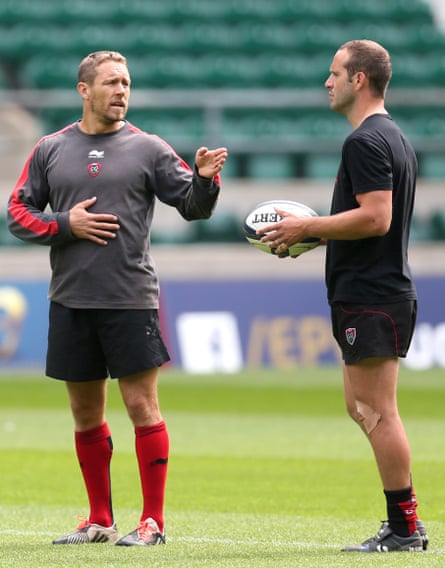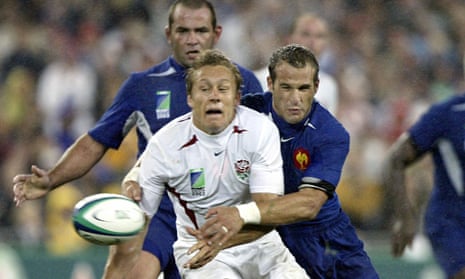France have developed a custom on match days with an evening kick-off of finding a coffee house at noon where the players can relax over an espresso and talk about something other than rugby. In days past, Frédéric Michalak, their outside-half – who, even before he was first capped as a teenager in 2001, had a reputation for being horizontally laid-back – would have been the first to test the knowledge of the barista. But as his career draws near its final plays, he has undergone a radical conversion.
On the day they were playing their opening match of the World Cup against Italy at Twickenham, the France players were in their team coach driving through Windsor when someone spotted a Café Rouge. They went in for a dose of caffeine, all except the man who in France has come to be called Jonny Michalak. He had spotted a field nearby and, armed with the sack of balls he takes everywhere, he headed for it along with the team’s kicking coach, Romain Teulet, who, instead of relaxing over a coffee found himself standing with his arms in the air to simulate posts as Michalak carefully went through the routine laid down for him by his kicking advisor at Toulon, Jonny Wilkinson.
The careers of Wilkinson and Michalak overlapped and they were on opposite sides in the 2003 World Cup semi-final in Sydney when the Englishman excelled in the wind and rain and the young Frenchman’s composure was washed away. Michalak’s career slowly declined after that 24-7 defeat until he joined Toulon in 2012, having spent four years in South Africa. At the Stade Mayol he came under the influence of the workaholic Wilkinson who, since retiring in the summer of 2014, has worked with the club’s goalkickers. If Leigh Halfpenny had little room for improvement, Michalak was a different matter.
“There is no doubt that Fred’s kicking has improved considerably since he has worked with Jonny Wilkinson,” said Teulet before the start of the World Cup. “It is every aspect of his kicking, not just off the tee. He is now our rainmaker.”
To the France forwards coach, Yannick Bru, who played for Toulouse when Michalak joined the club as an 18-year-old, the transformation has been remarkable. “The player I remember joining Toulouse has very little to do with the one we have today,” he said. “We have lost the carefree boy who surfed on the wave of his talent and we have before us now a model professional player whose thirst for work is never quenched.”
From being a player described as a “grandad of an outside-half” by Sir Clive Woodward a few years ago, Michalak, who is 33 on Friday, has become an outside-half the France head coach, Philippe Saint-André, trusts to lead Les Bleus tactically. “He is very important to us,” Saint-André said. “He has been involved in a few World Cups but knows this will be his last. He has always had class but was unlucky with injuries. Now he is putting his experience to very good use.”
Michalak used to be an unreliable goalkicker but since coming under Wilkinson’s influence his success rate has increased. He has scored 33 points in his two World Cup matches and during the victory over England in Paris in August, he became his country’s leading points-scorer. He now adopts Wilkinson’s routine in training, lining up kicks from various distances and angles and not leaving the field until every one of them has gone between the posts. Even on his days off, he can be found kicking; as well as kicking for goal at Windsor he went through a series of up-and-unders, restarts, drop goals and touch-finders.
“I work on my kicking every day because it is important for the team,” he said. “I still look for space when I have the ball but my job is to organise and get us in the right areas.

“My only goal since I returned to France is to win the World Cup. We are all working hard for that, putting everything else aside to help us achieve our aim. Ireland is an important game for us because we want to finish at the top of our group and go into the knockout stage unbeaten.”
The France captain, Thierry Dusautoir, struggles like Bru to compare the two versions of Michalak. “He has matured and is now comfortable being in charge of our backline,” he said, “but he has not lost his ability to improvise and surprise opponents.”
The centre Alexandre Dumoulin, who will be on the bench , compares the outside-half to his Ireland opposite number, Jonathan Sexton. “They are both match-winners,” he said. “Like Sexton, Fred is a great player whose many qualities include kicking points.”
Bernard Laporte was France’s coach in 2003 when they lost to England. Four years later the teams met again at the same stage at the Stade de France when Michalak was relegated to the bench for what turned out to be another victory for England. “Frédéric is confident again,” said Laporte, who is now Toulon’s head coach. “His kicking percentage is around 90% and, as we know, goalkickers win World Cups.”
When Michalak started his career he kicked goals from inside his own half, but his range is now slightly shorter. The full-back, Scott Spedding, takes the responsibility from distance and he has come to know the outside-half well only over the past few months, because Michalak missed the last autumn international campaign and Six Nations through injury.
“The first thing that struck me was how hard he works,” Spedding said. “I knew he was a great player but I did not know how dedicated he was. The reason he is doing so well is down to all the preparation he is putting in on all aspects of his kicking.
“You can see Wilkinson in the hours he spends on the field practising and the focus in his eyes. Some guys might be messing around near him but he is not bothered by that. He is wrapped up in what he has to do and on our off days he is out on the training field as well as mornings before games. He is mature enough now to know that hard work pays off.”
